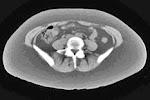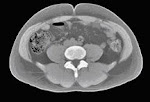Dr. Yaiping Yang and his colleagues at the Lawson Health Research Institute (affiliated with The University of Western Ontario) have found that abdominal fat tissue can reproduce a hormone that stimulates fat cell production. In simple words, this might as well mean that the extra fat around the belly is capable of making the person hungrier, so that he eats more, which in turn causes even more fat around the middle.
The hormone responsible for this vicious cycle is called Neuropeptide Y (NPY). Earlier it was believed that only brain produces this hormone; Yang’s research now reveals that NPY is reproduced by abdominal fat tissue as well.
The traditional belief that has existed so far says that one of the main reasons why overweight people eat more food is because their brains produce the hormone NPY in excessive amounts.
The researchers hope this discovery will change in the way we think about and treat abdominal obesity. NPY, Neuropeptide Y, is the most powerful appetite-stimulating hormone known, which sends signals to the humans that they are constantly hungry.
However, Yang, a Professor in the Departments of Obstetrics & Gynecology and Physiology & Pharmacology at the Schulich School of Medicine & Dentistry (University of Western Ontario), has evidence that abdominal fat is also capable of producing NPY.
Fat cells cannot replicate themselves, but NPY can increase the fat cell number by stimulating the replication of fat cell precursor cells, which can then change into fat cells. Quoting Yang, "this may lead to a vicious cycle where NPY produced in the brain causes you to eat more and therefore gain more fat around your middle, and then that fat produces more NYP hormone which leads to even more fat cells."
Being overweight, irrespective of where the fat is stored, is unhealthy. The disturbing point here is, because of its anatomical position and its byproducts, abdominal fat is considered to be the most dangerous. People predisposed to the ‘apple shape’ are at an elevated risk for heart disease, Type 2 diabetes, hypertension and some cancers.
The researchers will be soon investigating whether NPY produced by fat is released into the body's circulatory system and if NPY could potentially be transported in the blood to the brain, where it can act on the brain to stimulate feelings of hunger.
These findings were reported in a recent issue of The FASEB Journal.
All the more reason for you to realize that it is much better to prevent obesity than to go about treating the diseases caused by obesity.
Subscribe to:
Post Comments (Atom)


I just finished reading your entire blog... and I saw this new post.... Very informative
ReplyDelete